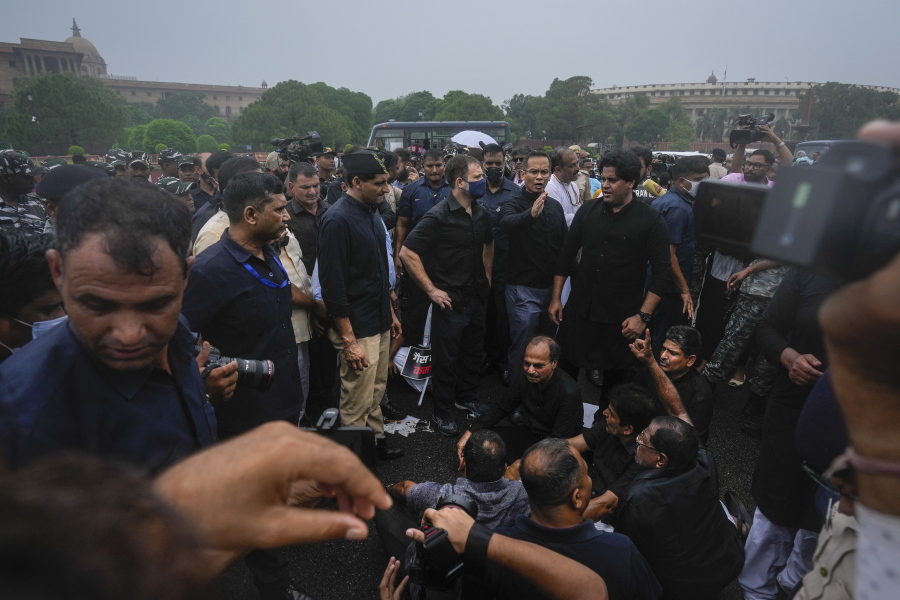NEW DELHI — The Aug. 5 demonstrations by India’s main opposition Congress party against soaring food prices and unemployment began like any other recent protest — an electorally weak opposition taking to the New Delhi streets against Prime Minister Narendra Modi’s massively popular government.
The protests, however, quickly took a turn when key Congress lawmakers led by Rahul Gandhi — Modi’s main opponent in the last two general elections — trooped to the Parliament, leading to fierce standoffs with police.
“Democracy is a memory (in India),” Gandhi later tweeted, describing the dramatic photographs that showed him and his party leaders being briefly detained by police.
Gandhi’s statement was largely seen as yet another frantic effort by a crisis-ridden opposition party to shore up its relevance and was dismissed by the government. But it resonated amid growing sentiment that India’s democracy — the world’s largest, with nearly 1.4 billion people — is in retreat and its democratic foundations are floundering.
Experts and critics say trust in the judiciary as a check on executive power is eroding. Assaults on the press and free speech have grown brazen. Religious minorities are facing increasing attacks by Hindu nationalists. And largely peaceful protests, sometimes against provocative policies, have been stamped out by internet clampdowns and the jailing of activists.
“Most former colonies have struggled to put a lasting democratic process in place. India was more successful than most in doing that,” said Booker Prize-winning novelist and activist Arundhati Roy. “And now, 75 years on, to witness it being dismantled systematically and in shockingly violent ways is traumatic.”
Modi’s ministers say India’s democratic principles are robust, even thriving.
“If today there is a sense in the world that democracy is, in some form, the future, then a large part of it is due to India,” External Affairs Minister Subrahmanyam Jaishankar said in April. “There was a time when, in this part of the world, we were the only democracy.”
History is on Jaishankar’s side.
At midnight on Aug. 15, 1947, the red sandstone parliamentary building in the heart of India’s capital echoed with the high-pitched voice of Jawaharlal Nehru, the country’s first prime minister.
“At the stroke of the midnight hour, when the world sleeps, India will awake to life and freedom,” Nehru famously spoke, words that were heard over live radio by millions of Indians. Then he promised: “To the nations and peoples of the world, we send greetings and pledge ourselves to cooperate with them in furthering peace, freedom and democracy.”
It marked India’s transition from a British colony to a democracy — the first in South Asia — that has since transformed from a poverty-stricken nation into one of the world’s fastest-growing economies, earning itself a seat at the global high table and becoming a democratic counterweight to its authoritarian neighbor, China.
Apart from a brief interruption in 1975 when a formal emergency was declared under the Congress party rule that saw outright censorship, India clung doggedly to its democratic convictions — largely due to free elections, an independent judiciary that confronted the executive, a thriving media, strong opposition and peaceful transitions of power.
But experts and critics say the country has been gradually departing from some commitments and argue that the backsliding has accelerated since Modi came to power in 2014. They accuse his populist government of using unbridled political power to undermine democratic freedoms and preoccupying itself with pursuing a Hindu nationalist agenda.
“The decline seems to continue across several core formal democratic institutions … such as the freedom of expression and alternative sources of information, and freedom of association,” said Staffan I. Lindberg, political scientist and director of the V-Dem Institute, a Sweden-based research center that rates the health of democracies.
Modi’s party denies this. Spokesperson Shehzad Poonawalla said India has been a “thriving democracy” under Modi’s rule.
Most democracies are hardly immune to strains.
The number of countries experiencing democratic backsliding “has never been as high” as in the past decade, the International Institute for Democracy and Electoral Assistance said last year, adding the U.S. to the list along with India and Brazil.
Earlier this year, the U.S.-based nonprofit Freedom House downgraded India from a free democracy to “partially free.” The V-Dem Institute classified it as an “electoral autocracy” on par with Russia.



